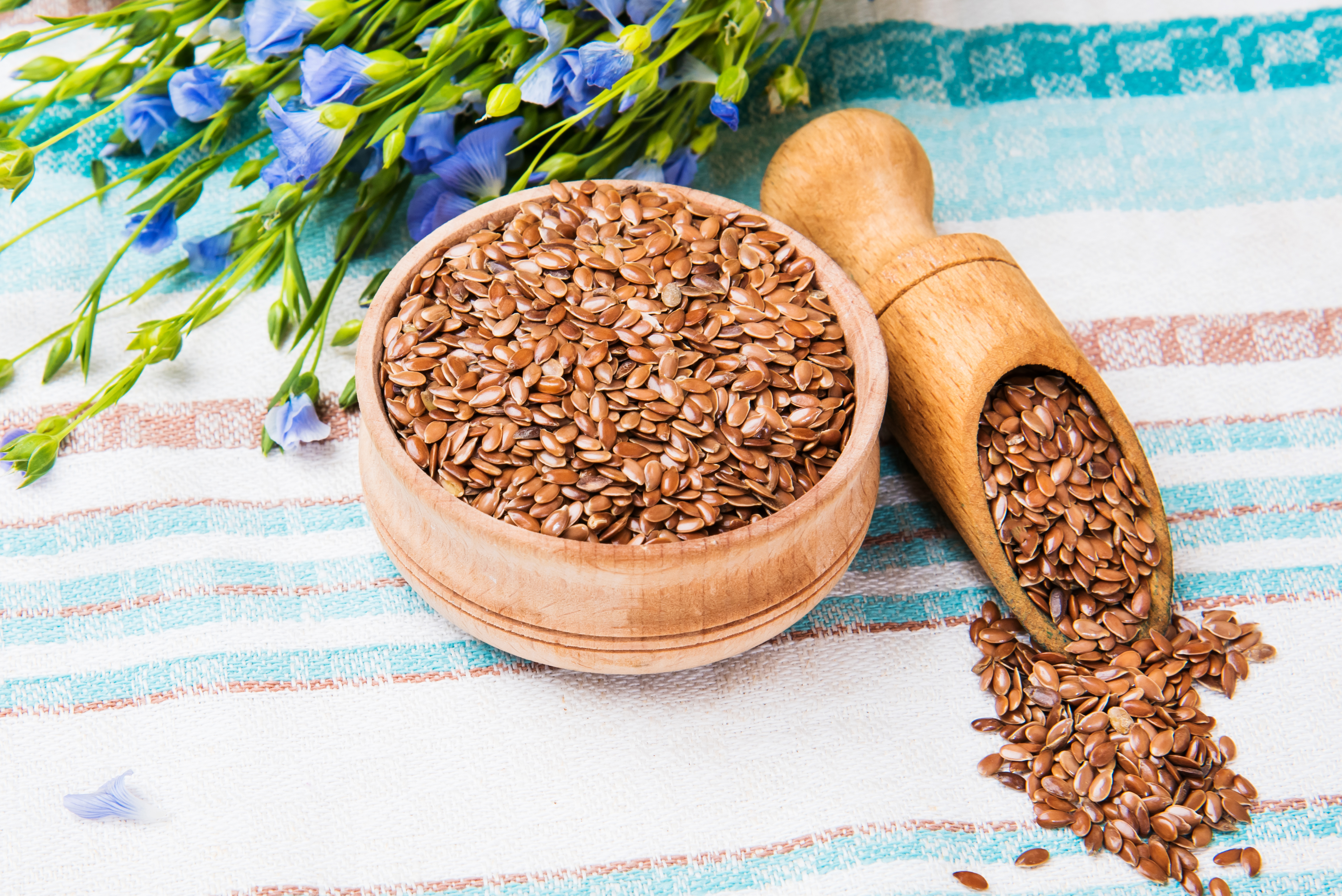What Happens To Your Body When You Eat Flaxseeds
Have you ever looked at a package of granola or a recipe online that calls for flaxseeds and thought, “What is that?” While chia seeds seem more popular to use in recipes like overnight oats or even pudding, flaxseeds are the underdog ingredient that you should start paying attention to. Whether you buy them whole, ground, or grind them up yourself at home, you can reap some of the amazing benefits of flaxseeds by adding just one spoonful to your daily routine.
From improving your digestion and decreasing your risk of disease to improving your cognitive function, there are many ways that adding flaxseeds to your recipes can help support your overall health. Below, we break down a few benefits of eating flaxseeds, plus provide some helpful tips to enable incorporating more flaxseeds into your regular diet. Though generally nutritious and beneficial to your short- and long-term health, no food is perfect—and even flaxseeds can have a downside when not eaten in moderation. So, to also give you a well-rounded perspective on this fiber-rich food, we’re sharing some potential negative effects of consuming flaxseeds in excess, too.
To learn more about what happens to your body when you eat flaxseeds, including the possible side effects and benefits of this food, keep reading—and for more healthy eating advice assessing the effects of certain foods, be sure to check out What Happens to Your Body When You Eat Chia Seeds.
What is flaxseed?
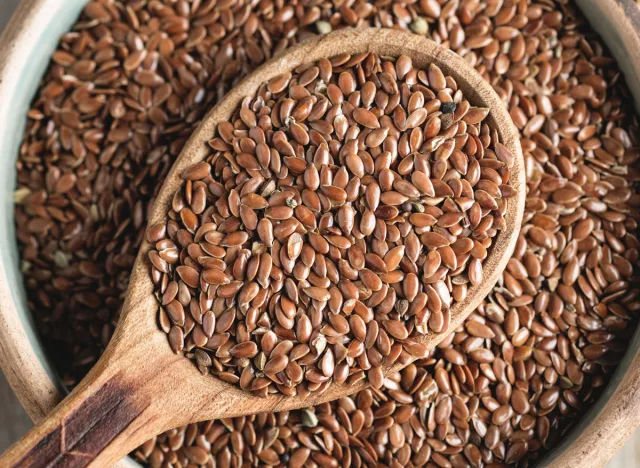
In essence, flaxseed is exactly what it sounds like; it is the seed from the flax plant, also known as Linum usitatissimum.
According to the Journal of Food Science and Technology, this seed has been used since the beginning of civilization, and has since morphed into a common functional food ingredient—which means it can provide benefits to specific functions or the overall health of your body. It is also known as being one of the best sources of ALA (alpha-lipoic acid), which is a type of omega-3 fatty acid.
You can purchase whole flaxseeds or ground, or you can take whole and grind them up yourself using a blender, food processor, or coffee grinder.
Flaxseed nutrition facts
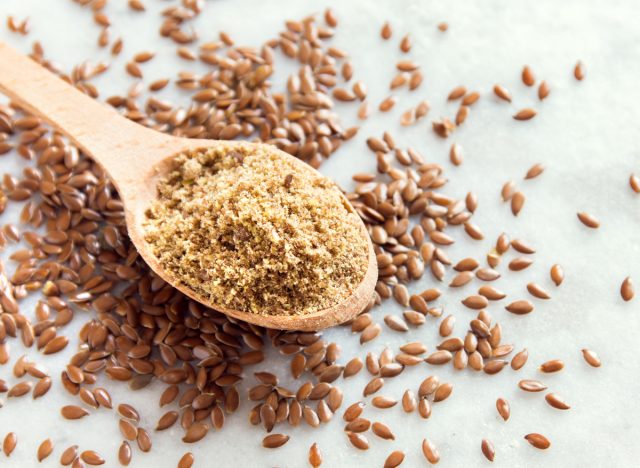
Nutrients per 1 tablespoon of ground flaxseeds:
- Calories: 37.4
- Fat: 3 grams
- Saturated Fat: <1 gram
- Sodium: 2.1 milligrams
- Carbs: 2 grams
- Sugar: <1 gram
- Fiber: 1.9 grams
- Protein: 1.3 grams
Nutrients per 1 tablespoon of whole flaxseeds:
- Calories: 55
- Fat: 4.4 grams
- Saturated Fat: <1 gram
- Sodium: 3 milligrams
- Carbs: 3 grams
- Sugar: <1 gram
- Fiber: 2.8 grams
- Protein: 1.9 grams
Ground vs. whole flaxseed
Consuming both ground or whole flaxseed can be beneficial for your health, but experts say that ground may be a bit better than whole. According to the School of Nutrition Science and Policy at Tufts University, your body is able to digest ground flaxseed more easily than whole. This is because the outer shell of a whole flaxseed is made of soluble fiber, which can’t be dissolved in water. This makes ground flaxseed more bioavailable, and means that whole flax can’t provide you with as many of the nutrients.
5 Benefits of Flaxseeds
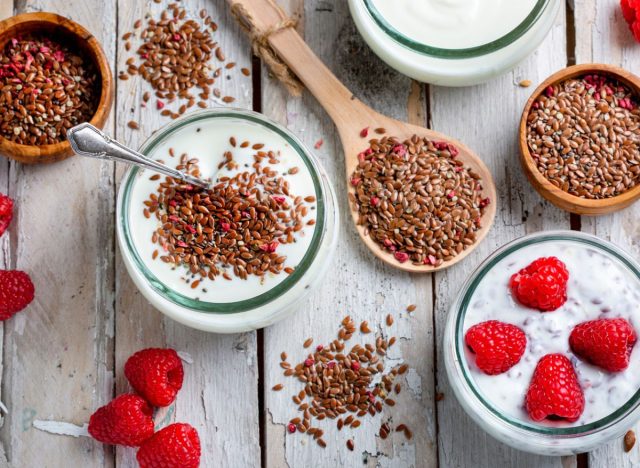
1. Flaxseeds are bursting with fiber.
If you’re looking to increase your fiber intake easily, adding flaxseeds to your meal can be a great way to start. One tablespoon of whole flaxseeds has almost 3 grams of fiber, which equates to 11% of your recommended daily value.
According to the American Heart Association, you should be getting an average of 25 to 30 grams of fiber a day, but Americans usually get around a mere 15 grams. A diet low in fiber not only impacts your weight management efforts, but can also cause digestion issues and even increase your risk of developing chronic diseases.
2. Flaxseeds are a rich source of omega-3 fatty acids.
Specifically, flaxseeds are rich in alpha-linolenic acid (ALA), a type of essential fatty acid that your body cannot produce. The only way to obtain it is through food—and flaxseeds are full of them.
In general, consuming omega-3 fatty acids has been proven to reduce inflammation in the body, which can help prevent the development of chronic diseases. In particular, ALA has been linked to decreasing the risk of heart disease—like heart attack and stroke—as well as reducing high blood pressure. Flaxseeds are a rich source of ALA along with walnuts, fatty fish, and some plants.
3. Flaxseeds can benefit your overall heart health.
As mentioned, ALA can help with decreasing your heart disease risk. According to a study review in Advances of Nutrition, there is strong evidence of ALA consumption and the reduced risk of cardiovascular disease. This is due to the fact that ALA is a polyunsaturated fatty acid (PUFA), which has anti-inflammatory effects on the body and has been proven to decrease the risk of heart disease. They also have powerful antihypertensive, anticancer, antioxidant, antidepression, antiaging, and antiarthritis effects, according to Advances in Food and Nutrition Research.
Studies also show that flaxseed consumption can help with lowering your blood cholesterol levels. A high level of LDL “bad” cholesterol in your system can cause a buildup in your arteries, which can in turn increase your risk of heart disease.
Another heart-related flaxseed benefit is that they can also effectively lower your blood pressure, which is important for preventing heart attack and stroke.
4. Flaxseeds can assist with digestion.
Flax seeds are known to be a natural laxative, which can help with the digestion process and constipation. A 12-week study published in Nutrition & Metabolism found flaxseed when added to baked goods was able to decrease constipation symptoms, as well as glycemic and lipid levels, for those with type 2 diabetes.
Plus, flaxseed consumption has also been shown to positively alter the gut microbiome during digestion by increasing the bacterial flora in your gut. It also reduces the presence of Proteobacteria and Porphyromonadaceae, which have been linked to alcoholic liver disease, according to Nutrients.
5. Flaxseeds can aid weight management.
Maintaining a healthy weight is important for keeping your body healthy for the long term, so incorporating flaxseeds into your diet can be a key way to keeping your weight at a healthy number. In particular, the fiber in the flaxseeds can help with feeling full for longer periods of time, according to Appetite.
Flaxseed supplementation has also been linked to glucose control and insulin sensitivity, which have both been proven to have an impact on weight management.
Possible Side Effects of Eating Flaxseed
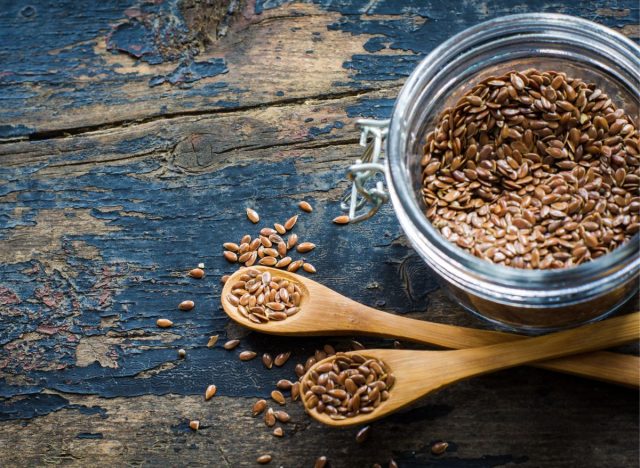
1. Flaxseeds may reduce the absorption of some minerals.
This isn’t a side effect of eating flaxseeds you’ll have to worry about too much, but it’s something to keep in mind if you suffer from an iron or zinc deficiency.
Flaxseeds contain phytic acid, a type of anti-nutrient that can reduce the absorption of minerals like calcium, zinc, magnesium, copper, and iron. While this can seem like a negative side effect of consuming flaxseeds, the effects are so minuscule that they are even less threatening than soybean and canola seeds, according to the Journal of Food Science and Technology.
2. Flaxseeds could cause digestive problems.
While fiber is beneficial for overall digestive health, having too much fiber can cause digestive problems—especially if you aren’t used to eating a lot of fiber in one sitting. Eating too much fiber at once can cause bloating, gas, and possible stomach pain.
If you’re looking to add more fiber to your diet, make sure to increase your number gently in order to avoid any digestion discomfort. Adding conservative amounts of flaxseeds to your baked goods or other common breakfast items is a great and tasty place to start.
6 Ideas for How to Eat Flaxseed
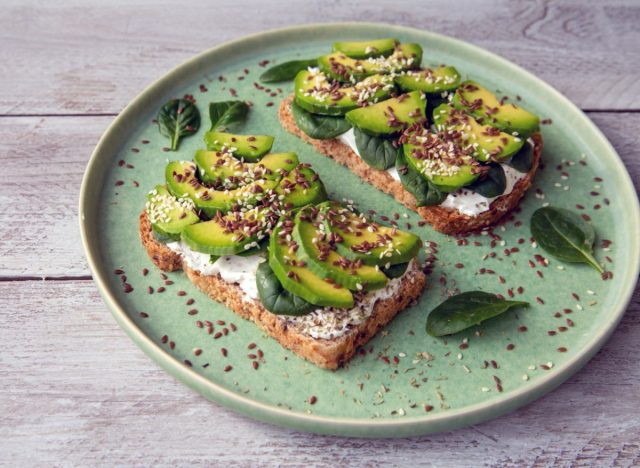
If you’re excited about the potential flaxseed benefits listed above but need some inspiration for how to eat them, try one of these simple (and delicious) options:
- Add them to your smoothie.
- Throw them in your oatmeal.
- Sprinkle them on top of avocado toast.
- Mix them in your granola.
- Combine them with your pancake or waffle batter.
- Use them as a yogurt topping.
This story has been updated to include additional copy and proofreading revisions, additional research, and updated contextual links.
